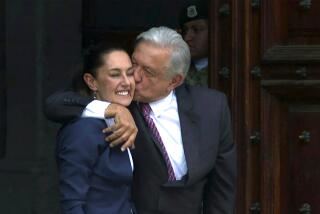New Philippine Constitution Submitted to Aquino; Nationwide Vote Set for Jan. 23
- Share via
MANILA — The 46 men and women appointed by President Corazon Aquino to draw up a new constitution formally signed the document Wednesday, taking a major step toward bringing political stability to the Philippines.
After signing the official draft of the new constitution, which says that Aquino is to be president until 1992, the group submitted the document to Aquino.
The head of the group, Celia Munoz-Palma, said: “There is no perfect document in the world, except the word of God. But it is a document which brings hope to our people.”
The new constitution, which also bans abortion, abolishes the death penalty, calls for massive land reform, demands equality of the sexes and restores dozens of freedoms taken away under deposed President Ferdinand E. Marcos, will be submitted to a referendum scheduled for Jan. 23. Most political leaders say they believe the people will approve it.
Aquino to Campaign
President Aquino, who vowed that she would not interfere with the commission that wrote it, has said she will campaign for ratification, but several opposition groups have announced that they will fight it.
“Democracy is safe with this constitution,” Aquino said in a speech Wednesday night.
To critics who have said Aquino should combine the ratification vote with a referendum on her right to continue as president, she said: “That is their problem. . . . My election by the people is the one certain landmark that we have as we move toward the future.”
Then, quoting from a Chinese proverb, she added, “Despite the barking of the dogs in the night, let the caravan go on.”
For the last seven months, since she succeeded Marcos after his government was overthrown, Aquino has been governing under a temporary constitution she decreed in March.
Reaction to Dictatorship
Much of the constitution submitted Wednesday was written in reaction to the Marcos dictatorship, which ruled with unlimited executive powers for nine years under martial law.
Under the new charter, a president can impose martial law for no more than 60 days, and then only in the event of invasion or rebellion. Warrants for arrest and detention, virtually everyday events under Marcos, may be issued only by the courts. Judicial appointments may be made only on the recommendation of a special commission of lawyers.
“Torture, force, violence, threat and intimidation” are specifically banned under the new constitution, as is nepotism and the accumulation of personal wealth by a serving president.
In explaining the strong anti-Marcos tone of the document, Blas F. Ople, a minister of labor under Marcos and a member of the drafting commission, said, “The past 20 years have been replete with experiences, lessons and traumas . . . on what should be avoided.”
For most of the commission members, according to Munoz-Palma, the commission president, the document is intended primarily “to liberate the nation from despotism and tyranny.”
‘Love Is Imperative’
She said it is the first national constitution in the world that contains the word love, and she said that “love is imperative if peace is to be restored in our troubled land.” The heart of the document, she said, is a special article on social justice that requires Filipino politicians to work for substantial reforms in labor, land ownership, health and housing.
All the commission’s members agreed that it contains imperfections, shortcomings and inadequacies and that it is “verbose” and “too long.”
Leftist members of the commission sharply criticized it for failing to state clearly how land reform and redistribution of the wealth are to be carried out in a country where 1% of the 55 million people have 21% of its assets, and where 70% live below the poverty line.
Even more heated was their criticism of a provision that would permit the continued presence of two U.S. military bases in the Philippines.
Clause on Bases
In a section on Philippine sovereignty, the document says that all foreign military bases will be banned from the country after 1991, when the present agreement on the U.S. bases expires, but it qualifies this by adding “except under terms of a treaty” approved by the Philippine Senate and Congress.
The most controversial aspect of the new constitution is a provision that President Aquino and other political leaders believe is the most crucial--the article on the executive branch. It says that Aquino and her vice president, Salvador Laurel, are the duly elected national leaders and that their terms will continue until June, 1992.
This “constitutionalization” of the Aquino government is seen by her advisers as a stabilizing force in a country still torn by political divisions.
Opposition leaders argue that Aquino, who assumed the presidency just before Marcos was routed, should stand for election next spring, when Aquino has scheduled local and national elections for the Congress created by the new constitution.
Fraudulent Election
The anti-Marcos rebellion was triggered in part by the fraudulent presidential election of Feb. 7. A week later, Marcos’ rubber-stamp National Assembly declared him the winner. But official observers here and abroad concluded that Aquino had won.
Aquino’s opponents and also some of her supporters--chief among them Defense Minister Juan Ponce Enrile--have been calling for the president to ask the Filipino voters whether she should stand for reelection at the same time they vote on the constitution. The proposal has even been endorsed by one of Aquino’s Cabinet ministers, who said such a referendum “would end once and for all any doubts that Cory Aquino has the total mandate of the Filipino people.”
More to Read
Sign up for Essential California
The most important California stories and recommendations in your inbox every morning.
You may occasionally receive promotional content from the Los Angeles Times.









